How to Socializing Puppies with Other Dogs: 10 Best Practices and Tips: Puppies are curious, playful, and social animals. They crave attention, interaction, and playtime with other dogs. However, socializing puppies with other dogs requires careful consideration of their health, age, and behavior. In this post, we’ll explore the key aspects to consider when socializing your puppy with other dogs and provide tips for a safe and successful experience.
The benefits of Socializing Puppies with Other Dogs

Socializing them with other dogs has advantages for their physical and cognitive health. Some of the key advantages of socializing puppies with other dogs include the following:
- Improved social skills: Puppies can learn important social skills to communicate and interact with different dogs.
- Reduced anxiety: Puppies exposed at a young age are less likely to have anxiety or fear toward new experiences later in life.
- Better behavior: It can control future behavior problems, such as aggression towards other dogs, by teaching them how to play and communicate appropriately.
- Increased exercise: Dogs are social animals and enjoy playing and exercising with other dogs, which can give them additional exercise and mental stimulation.
- Greater confidence: Socialization can help your puppy develop confidence and independence, which is crucial for their well-being.
- Improved immune system: Exposure to various environments and germs during socialization can allow your puppy to develop a stronger immune system, reducing the risk of illness in the future.
Common Puppies Socialization Problems with Other Dogs
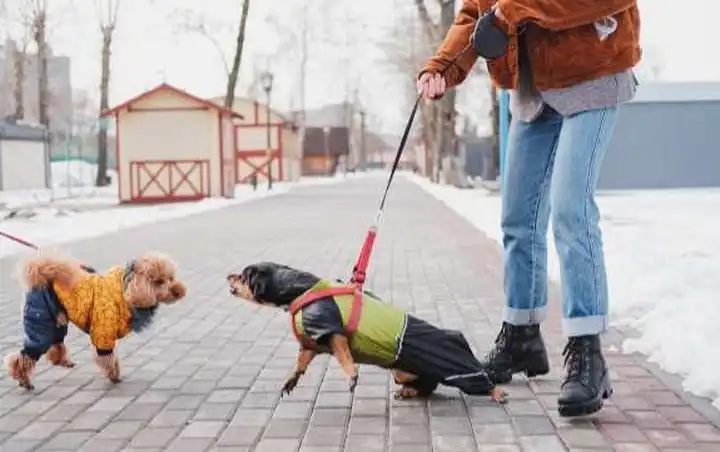
You can overcome common socialization problems with patience and consistency. Here are some tips:
- Fearful behavior: If your puppy fears other dogs, socialize with calm, friendly dogs in a cool environment. Gradually introduce your puppy to more dogs as they become comfortable.
- Aggressive behavior: If your puppy is aggressive towards other dogs, immediately separate them and consult an experienced dog trainer or behaviorist. They can assist you in determining the cause of the behavior and provide training techniques to address it.
- Overwhelming interactions: If your puppy is overwhelmed by interactions with other dogs, start by socializing them with dogs of a similar size and age. Gradually introduce your puppy to larger or more energetic dogs as they become cozier.
- Lack of interest: If your puppy is not interested in socializing with other dogs, try instructing them to other kinds of play and toys to make the occasion more engaging.
- Overstimulation: Giving them a break and a quiet relaxing space is important if your puppy becomes overstimulated during socialization.
Socializing Puppies with Other Dogs: Tips for Different Breeds
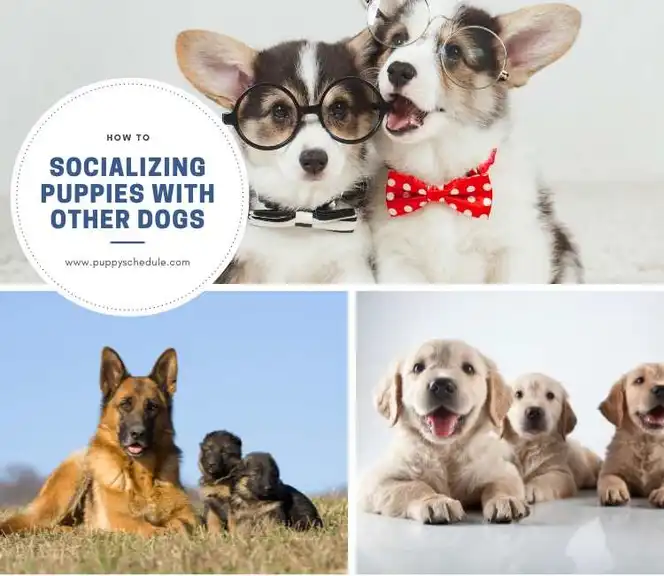
Different breeds may require different approaches to socializing puppies with other dogs. Here are some tips for socializing puppies with other dogs based on their breed:
- Small Breeds: Small breeds such as Chihuahuas, Toy Poodles, and Yorkshire Terriers can be more susceptible to fear and anxiety when socializing with larger dogs. Start socializing with other small, calm dogs and gradually introduce them to larger dogs as they become more comfortable.
- Large Breeds: Large breeds such as Great Danes, Mastiffs, and Saint Bernards may require more controlled socialization due to their size and strength. Always supervise interactions with other dogs, and start with calm and friendly dogs of a similar size and age.
- Herding Breeds: Border Collies, Australian Shepherds, and Corgis may have an instinct to herd other dogs. Socialize them with dogs with a similar play style, and avoid allowing them to herd other dogs excessively.
- Terrier Breeds: Breeds such as Jack Russell Terriers, Bull Terriers, and Scottish Terriers may tend towards aggression towards other dogs. It is important to socialize them early and often with calm and friendly dogs and seek guidance from a professional dog trainer or behaviorist.
- Sporting Breeds: Breeds such as Labrador Retrievers, Golden Retrievers, and Pointers may have a natural affinity towards other dogs due to their breeding for hunting and retrieving.
Socialization with other puppies is essential for all breeds, but it is necessary to consider your puppy’s personality and breed characteristics when socializing with other dogs. Always supervise interactions and seek guidance from a professional dog trainer if you have concerns about your puppy’s socialization. Proper socialization allows your puppy to develop important social skills and enjoy a happy and healthy life with other dogs.
Importance of Socializing Puppies with Other Dogs
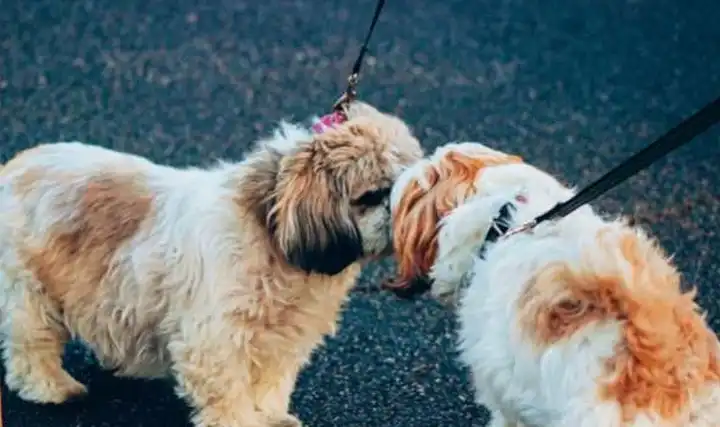
Socializing puppies with other dogs is a crucial aspect of their development. During their early weeks and months, puppies understand the earth around them and how to interact with other animals. Socialization with other puppies is necessary because it helps them develop social skills and communication abilities.
When puppies are socialized with other dogs, they learn how to read and respond to body language, vocalizations, and other social cues. This helps them develop confidence and the ability to communicate effectively with other dogs. Socialization also helps puppies learn to tolerate different play styles and personalities, which can prevent future behavior problems.
Puppies not socialized with other dogs may develop fear, anxiety, and aggression toward other dogs. This can make them difficult to handle and limit their capability to interact with other beasts. Additionally, lack of socialization can lead to health problems because it limits the puppy’s exposure to different environments and germs.
When Can Puppies Start Socializing with Other Dogs?
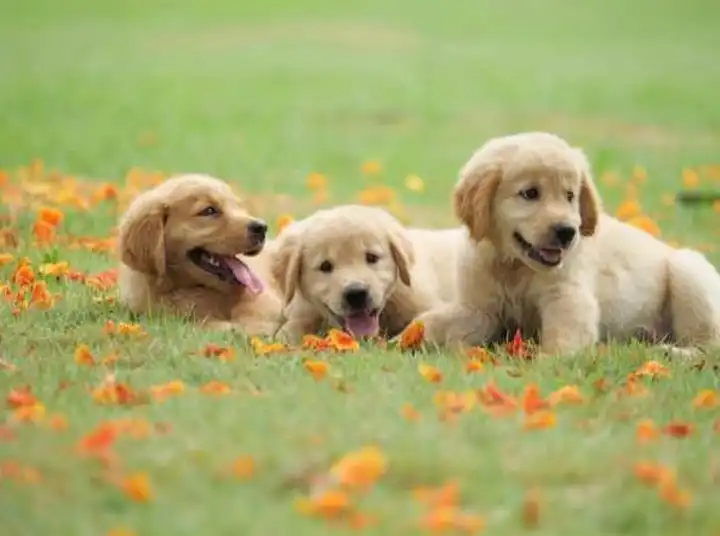
Several important factors to consider before puppies can begin socializing with other dogs.
Vaccination requirements
Before puppies can socialize with other dogs, they must have completed their vaccination series. They are generally vaccinated starting at 6-8 weeks of age and require several rounds of vaccinations to build immunity to common diseases, such as parvovirus and distemper. Consult with your veterinarian about your puppy’s vaccination schedule and when it’s safe to socialize with other dogs.
Age of Puppy
They can begin socializing with different dogs as early as 8 weeks of age. However, it’s vital to determine that puppies have different temperaments and socialization needs. Some puppies may need more time to develop confidence and social skills before being presented to different dogs. Consult with a professional dog trainer or behaviorist if you need clarification on your puppy’s readiness for socialization.
Health condition of the puppy
Puppies with health conditions, such as a weakened immune system or chronic illnesses, may need to wait longer before socializing with other dogs. Additionally, puppies with behavioral issues, such as aggression or fear, may require a more gradual approach to socialization.
Tips and Step-by-step Instructions for Socializing Puppies with Other Dogs tips
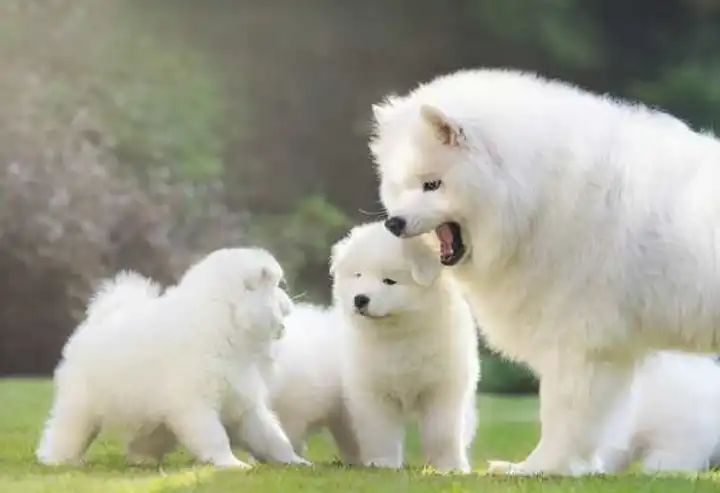
These are important tips and step-by-step instructions for socializing puppies with other dogs.
Start with one-on-one interactions.
When introducing your puppy to other dogs, start with one-on-one interactions in a controlled environment. This allows your puppy to get used to the presence of other dogs without feeling overwhelmed or threatened. Once your puppy is comfortable with one dog, gradually present them to more dogs.
Use positive reinforcement
Incentivize good behavior during socialization by offering treats and positive reinforcement. This allows them to associate positive experiences with other dogs and reinforces good behavior.
Monitor your puppy’s behavior.
Keep a close eye on your puppy’s behavior during socialization. Watch for signs of fear or aggression, such as growling, barking, or snapping. If your puppy displays any concerning behavior, separate them from the other dogs and try again later.
Conclusion
Socializing puppies with other dogs is important for their physical and mental health. When introducing your puppy to other dogs, consider their vaccination status, age, and health condition. Start with one-on-one interactions, use positive reinforcement, and monitor your puppy’s behavior for a safe and successful socialization experience. Remember that gradual socialization is key to a happy and healthy puppy.



